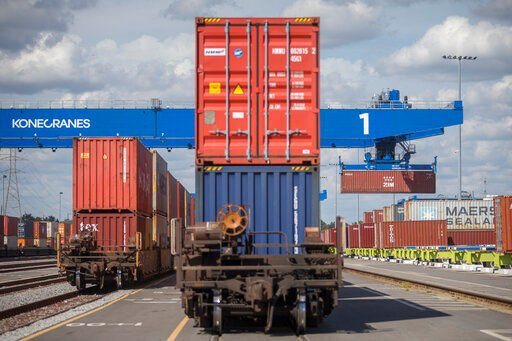WASHINGTON — Clogged U.S. ports are being given access to nearly $450 million in federal money from President Joe Biden’s infrastructure law as part of the administration’s recent stepped-up efforts aiming to ease supply chain congestion and lower prices for American consumers.
Transportation Secretary Pete Buttigieg today announced the availability of a first batch of competitive grants for ports that will be double last year’s amount annually for five years. The grants are aimed specifically at reducing bottlenecks that have slowed the flow of goods to store shelves and pushed up costs.
The grants are among several pots of money under the $1 trillion law that the department intends to steer toward providing mid-term and long-term relief to the nation’s supply chain, which administration officials described as somewhat outdated and broken. Still, acknowledging that the upgrades will take time, Biden officials have largely shied away from any assurances that Americans could see clear and demonstrable changes to their lives before the 2022 midterm elections.
U.S. ports will have until May to apply for the grants, which will be awarded by fall.
“We’re proud to announce this funding to help ports improve their infrastructure — to get goods moving more efficiently and help keep costs under control for American families,” Buttigieg said.
The Transportation Department was releasing this week a one-year report that assesses the supply chain and how best to fix gaps. Administration officials said the report urges better government cooperation and data-sharing with the private sector and pledges up to billions of dollars more from federal grant programs later this year to promote smoother rail, water and truck transportation and build out warehouse capacity.
Last year, the department took interim steps to unclog the supply chain and limit inflation pressures, awarding $241 million in grants including $52.3 million to help boost rail capacity at the port in Long Beach, Calif. It has strived to move major ports to longer work days and improve recruitment and retention in the trucking industry.
Biden has acknowledged potential added pain to consumers if U.S. sanctions against Russian President Vladimir Putin over Ukraine end up limiting Russia’s exports of oil and natural gas and causing global energy prices to soar. Separately, Biden on Tuesday announced new U.S. investments to boost domestic production of minerals used for electronics including electric vehicles, smartphones and appliances, part of a bid to reduce U.S. reliance on China.


